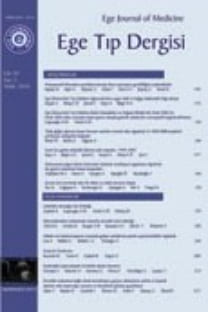Mulvihill-Smith sedromunda anestezi yönetimi
Anesthetic management in Mulvihill-Smith syndrome
___
- 1. Yagihashi T, Kato M, Izumi K, Kosaki R, Yago K, et al. Case report: adult phenotype of Mulvihill-Smith syndrome. Am J Med Genet A. 2009; 149A: 496–500.
- 2. Bartsch O, Tympner KD, Schwinger E, Gorlin RJ. Mulvihill-Smith syndrome: case report and review. J Med Genet. 1994; 31 (9): 707–711.
- 3. Passarelli PF, Cerroni L, Condo R, Mancini M, D’Addona A. Orofacial signs and dental abnormalities in patients with Mulvihill–Smith syndrome A literature review on this rare progeroid pathology. Medicine. 2018; 97: 18.
- 4. Stevic M, Simic D, Milojevic I. Anesthesia in a child with Mulvihill–Smith syndrome. J Anesth. 2014; 28: 313.
- 5. Menna R, Arancibias C. The Hutchinson–Gilford progeria syndrome: a case report. Minerva Anestesiol. 2010; 76: 151–4.
- 6. Kuribayashi J, Yamada T, Morisaki H, Takeda J. Anesthetic management of a patient with Mulvihill-Smith syndrome. Masui. 2007; 56 (7): 835-7.
- 7. Desborough JP. The stress response to trauma and surgery. Br J Anaesth. 2000; 85: 109-17.
- 8. Erden V, Basaranoglu G, Delatioglu H, Hamzaoglu NS. Relationship of difficult laryngoscopy to long-term non-insulin-dependent diyabetes and hand abnormality detected using the “prayer sign. Br J Anaesth. 2003; 91: 159-60.
- 9. American Diabetes Association. 15. Diyabetes Care in the Hospital: Standards of Medical Care in Diyabetes2019. Diyabetes Care 2019; 42: 173- 81.
- ISSN: 1016-9113
- Yayın Aralığı: 4
- Başlangıç: 1962
- Yayıncı: Ersin HACIOĞLU
Metastatik mide kanserinde karsinoembriyonik antijen (cea) prediktif midir?
Malign mezotelyomada kemoterapi uygulamaları
Melih ŞİMŞEK, Ulaş IŞIK, Orkun GÜRBÜZ
Burhan Sami KALIN, İhsan SOLMAZ
IgG'nin tayini için kapasitif bir biyosensör geliştirilmesi
Yılmaz YILDIRIMER, Emine KARTAL BALKAN, İbrahim DURMAZATAR
Duygu Doğa EKİZALİOĞLU, Selen BAYRAKTAROĞLU, Hakan POSACIOĞLU
Genel anestezi altında diz artroplastisi uygulanan hemofili hastalarında kronik ağrı
Zeynep ÇAĞIRAN, Nezih SERTÖZ, Semra KARAMAN, Abdürrahim DERBENT, Ali ZEYDANOĞLU
Nadir görülen plevral kitle: Plevral lipom
Pınar ÇELİK, Yavuz HAVLUCU, Deniz KIZILIRMAK, Recep SAVAŞ, Işıl SAK
Sefazolinin değişen dozlarının in vitro 3T3-Fare fibroblast kültürü üzerine etkisi
Belis KALECİ, Ali Can KOLUMAN, Bülent TANRIVERDİ, Gamze TANRIVERDİ
